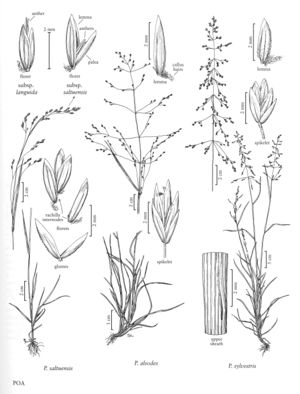Difference between revisions of "Poa saltuensis"
FNA>Volume Importer |
imported>Volume Importer |
||
| Line 4: | Line 4: | ||
|publications= | |publications= | ||
|common_names=Oldpasture bluegrass | |common_names=Oldpasture bluegrass | ||
| + | |special_status={{Treatment/ID/Special_status | ||
| + | |code=E | ||
| + | |label=Endemic | ||
| + | }} | ||
|basionyms= | |basionyms= | ||
|synonyms={{Treatment/ID/Synonym | |synonyms={{Treatment/ID/Synonym | ||
| Line 24: | Line 28: | ||
-->{{Treatment/Body | -->{{Treatment/Body | ||
| − | |distribution=Conn.;N.J.;N.Y.;Wis.;W.Va.;N.H.;N.C.;Tenn.;Pa.;R.I.;N.B.;Nfld. | + | |distribution=Conn.;N.J.;N.Y.;Wis.;W.Va.;N.H.;N.C.;Tenn.;Pa.;R.I.;N.B.;Nfld. and Labr. (Labr.);N.S.;Ont.;P.E.I.;Que.;Va.;Mass.;Maine;Vt.;Ill.;Ind.;Iowa;Md.;Ohio;Minn.;Mich.;Ky. |
|discussion=<p><i>Poa saltuensis</i> grows in woodlands of the north-central and northeastern United States and adjacent Canada, extending south to Tennessee. The two subspecies are sometimes treated as species. The variation between the two overlaps and is correlated to some extent with ecology and geography. <i>Poa marcida</i> (p. 512), a western species once included in <i>P. saltuensis</i>, differs in having closed sheaths and attenuate lemmas.</p> | |discussion=<p><i>Poa saltuensis</i> grows in woodlands of the north-central and northeastern United States and adjacent Canada, extending south to Tennessee. The two subspecies are sometimes treated as species. The variation between the two overlaps and is correlated to some extent with ecology and geography. <i>Poa marcida</i> (p. 512), a western species once included in <i>P. saltuensis</i>, differs in having closed sheaths and attenuate lemmas.</p> | ||
|tables= | |tables= | ||
| Line 56: | Line 60: | ||
|illustrator=Sandy Long | |illustrator=Sandy Long | ||
|illustration copyright=Utah State University | |illustration copyright=Utah State University | ||
| − | |distribution=Conn.;N.J.;N.Y.;Wis.;W.Va.;N.H.;N.C.;Tenn.;Pa.;R.I.;N.B.;Nfld. | + | |distribution=Conn.;N.J.;N.Y.;Wis.;W.Va.;N.H.;N.C.;Tenn.;Pa.;R.I.;N.B.;Nfld. and Labr. (Labr.);N.S.;Ont.;P.E.I.;Que.;Va.;Mass.;Maine;Vt.;Ill.;Ind.;Iowa;Md.;Ohio;Minn.;Mich.;Ky. |
|reference=None | |reference=None | ||
|publication title= | |publication title= | ||
|publication year= | |publication year= | ||
| − | |special status= | + | |special status=Endemic |
| − | |source xml=https:// | + | |source xml=https://bibilujan@bitbucket.org/aafc-mbb/fna-data-curation.git/src/bb6b7e3a7de7d3b7888a1ad48c7fd8f5c722d8d6/coarse_grained_fna_xml/V24/V24_709.xml |
|subfamily=Poaceae subfam. Pooideae | |subfamily=Poaceae subfam. Pooideae | ||
|tribe=Poaceae tribe Poeae | |tribe=Poaceae tribe Poeae | ||
Revision as of 22:49, 27 May 2020
Plants perennial; not rhizomatous, not stoloniferous, loosely tufted. Basal branching mainly pseudointravaginal. Culms 20-95 cm tall, 0.8-1.5 mm thick. Sheaths closed for 1/3-2/3 their length; ligules 0.2-3(4) mm, smooth or sparsely scabrous, truncate to obtuse; blades 1-3.6 (6) mm wide, flat, thin, lax, veins prominent. Panicles 4-20(24) cm long, less than 1/4 the plant height, lax; nodes with 1-3 branches; branches ascending to spreading, lax, angled, angles prominent, scabrous. Spikelets 3-5.6 mm, laterally compressed; florets 2-5; rachilla internodes glabrous, usually shorter than 1 mm. Glumes 2/3 – 3/4 as long as the adjacent lemmas, distinctly keeled; lower glumes 1(3)-veined; upper glumes shorter than or subequal to the lowest lemmas; calluses webbed; lemmas 2.4-4 mm, lanceolate to broadly lanceolate, distinctly keeled, usually glabrous, bases of marginal veins rarely sparsely softly puberulent, lateral veins prominent, intercostal regions smooth, minutely bumpy, apices obtuse to sharply acute or acuminate; palea keels scabrous; anthers 0.4-1.5 mm.
Distribution
Conn., N.J., N.Y., Wis., W.Va., N.H., N.C., Tenn., Pa., R.I., N.B., Nfld. and Labr. (Labr.), N.S., Ont., P.E.I., Que., Va., Mass., Maine, Vt., Ill., Ind., Iowa, Md., Ohio, Minn., Mich., Ky.
Discussion
Poa saltuensis grows in woodlands of the north-central and northeastern United States and adjacent Canada, extending south to Tennessee. The two subspecies are sometimes treated as species. The variation between the two overlaps and is correlated to some extent with ecology and geography. Poa marcida (p. 512), a western species once included in P. saltuensis, differs in having closed sheaths and attenuate lemmas.
Selected References
None.
Key
| 1 | Anthers 0.4-1 mm long; lemma apices obtuse to acute, firm or scarious for up to 0.25 mm | Poa saltuensis subsp. languida |
| 1 | Anthers 0.9-1.5 mm long; lemma apices acute to acuminate, scarious for 0.25-0.5 mm | Poa saltuensis subsp. saltuensis |
